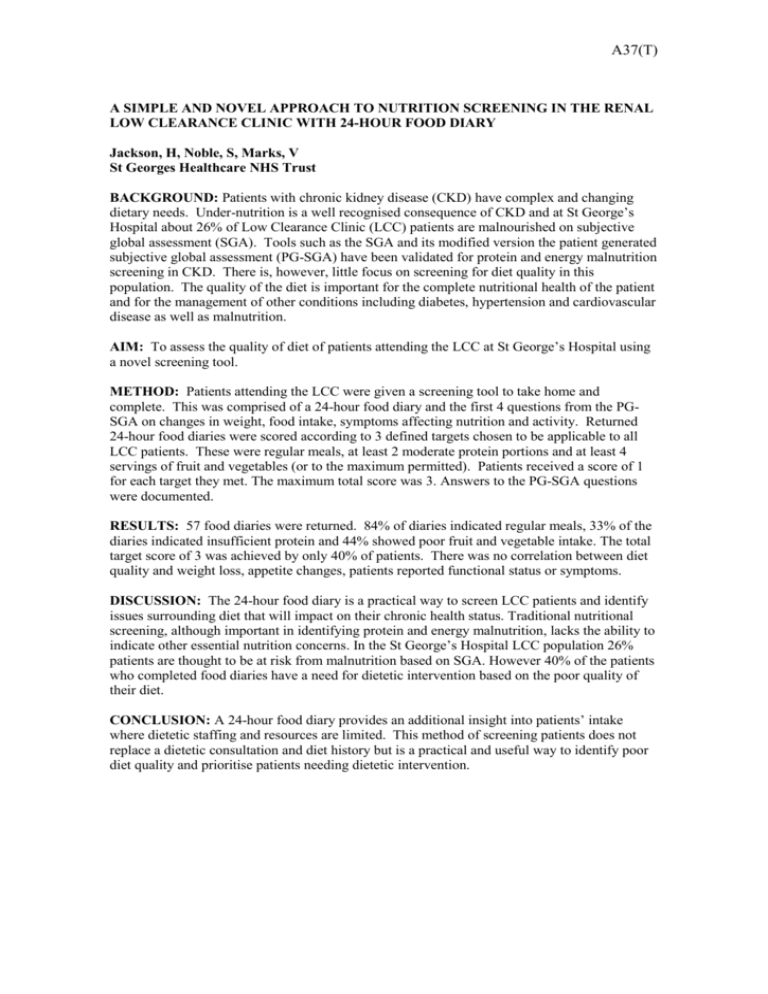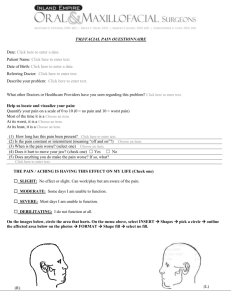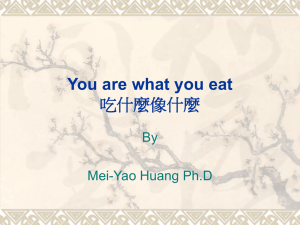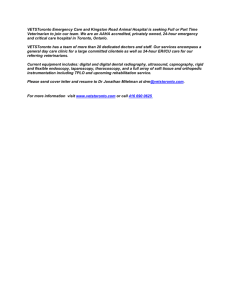Patients with chronic kidney disease (CKD)
advertisement

A37(T) A SIMPLE AND NOVEL APPROACH TO NUTRITION SCREENING IN THE RENAL LOW CLEARANCE CLINIC WITH 24-HOUR FOOD DIARY Jackson, H, Noble, S, Marks, V St Georges Healthcare NHS Trust BACKGROUND: Patients with chronic kidney disease (CKD) have complex and changing dietary needs. Under-nutrition is a well recognised consequence of CKD and at St George’s Hospital about 26% of Low Clearance Clinic (LCC) patients are malnourished on subjective global assessment (SGA). Tools such as the SGA and its modified version the patient generated subjective global assessment (PG-SGA) have been validated for protein and energy malnutrition screening in CKD. There is, however, little focus on screening for diet quality in this population. The quality of the diet is important for the complete nutritional health of the patient and for the management of other conditions including diabetes, hypertension and cardiovascular disease as well as malnutrition. AIM: To assess the quality of diet of patients attending the LCC at St George’s Hospital using a novel screening tool. METHOD: Patients attending the LCC were given a screening tool to take home and complete. This was comprised of a 24-hour food diary and the first 4 questions from the PGSGA on changes in weight, food intake, symptoms affecting nutrition and activity. Returned 24-hour food diaries were scored according to 3 defined targets chosen to be applicable to all LCC patients. These were regular meals, at least 2 moderate protein portions and at least 4 servings of fruit and vegetables (or to the maximum permitted). Patients received a score of 1 for each target they met. The maximum total score was 3. Answers to the PG-SGA questions were documented. RESULTS: 57 food diaries were returned. 84% of diaries indicated regular meals, 33% of the diaries indicated insufficient protein and 44% showed poor fruit and vegetable intake. The total target score of 3 was achieved by only 40% of patients. There was no correlation between diet quality and weight loss, appetite changes, patients reported functional status or symptoms. DISCUSSION: The 24-hour food diary is a practical way to screen LCC patients and identify issues surrounding diet that will impact on their chronic health status. Traditional nutritional screening, although important in identifying protein and energy malnutrition, lacks the ability to indicate other essential nutrition concerns. In the St George’s Hospital LCC population 26% patients are thought to be at risk from malnutrition based on SGA. However 40% of the patients who completed food diaries have a need for dietetic intervention based on the poor quality of their diet. CONCLUSION: A 24-hour food diary provides an additional insight into patients’ intake where dietetic staffing and resources are limited. This method of screening patients does not replace a dietetic consultation and diet history but is a practical and useful way to identify poor diet quality and prioritise patients needing dietetic intervention.






